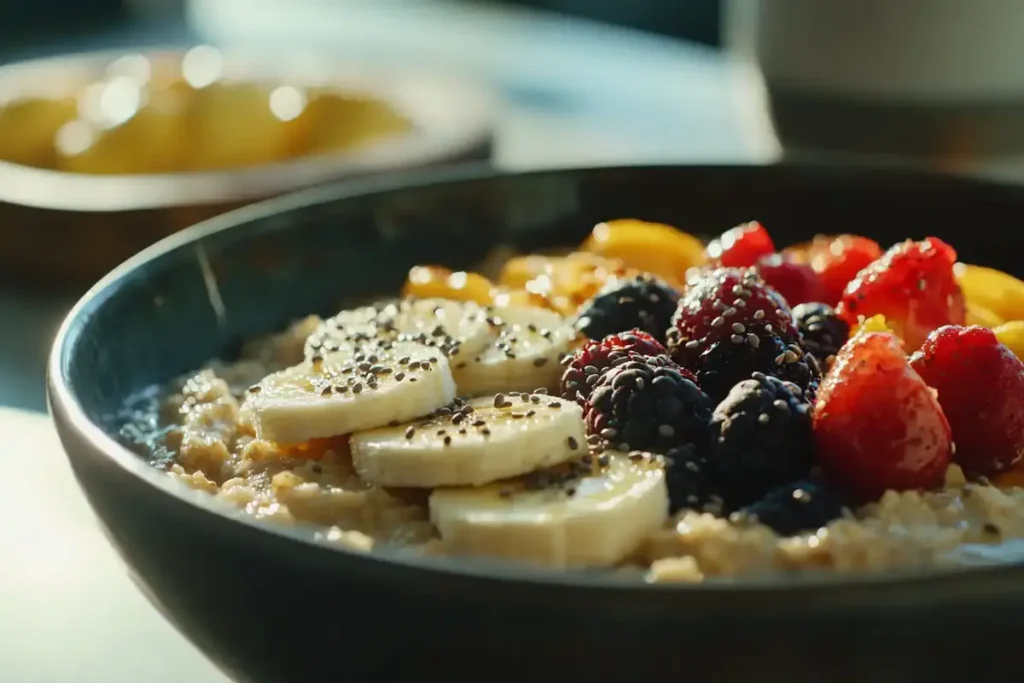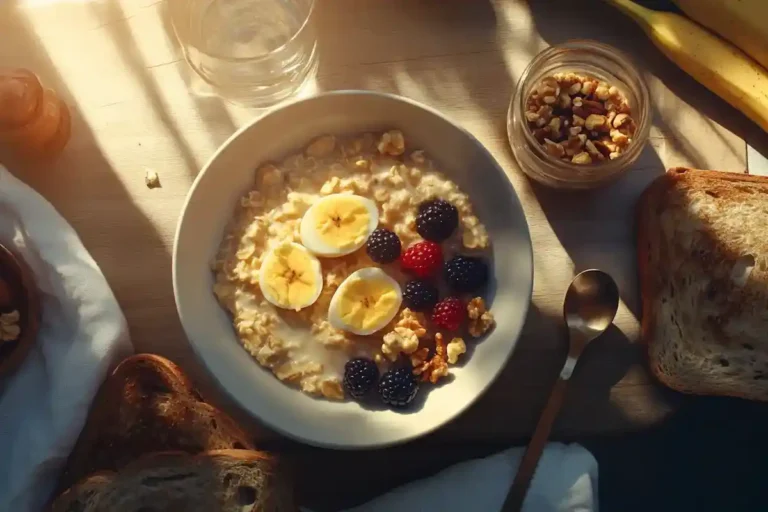Introduction
Preparing for a big event often brings up a key question: What to eat in the morning of competition? Whether you’re gearing up for a marathon, swim meet, dance performance, or any athletic contest, your breakfast can make or break your performance. That early meal is your fuel, helping you start strong and remain energized from start to finish.
Athletes commonly spend weeks or even months training to perfect their skills, endurance, and mindset. Yet, the final hours before a competition can have an equally significant impact on success. Fueling your body the right way on competition morning optimizes energy levels, mental clarity, and overall stamina. In this comprehensive guide, you’ll discover the ideal nutrients, meal structures, recipes, tips, and answers to frequently asked questions to ensure your morning-of-competition meal sets you up for victory.
1. Why Morning Nutrition Matters
Boosts Immediate Energy
The primary role of breakfast on competition day is to provide immediate energy. After an overnight fast, your body’s glycogen stores are partially depleted. Glycogen is your energy reservoir, found mainly in the muscles and liver. When you eat a balanced breakfast, you replenish these stores, ensuring you have accessible energy for sprints, jumps, lifts, or any intense movement required during your event.
Carbohydrates are often highlighted as the go-to morning fuel because they break down into glucose more quickly than proteins or fats. This glucose is carried to your muscles and brain, keeping you alert and ready for action. If you skip breakfast, you risk starting the competition with limited energy reserves.
Supports Mental Clarity
Competing doesn’t just rely on physical prowess; it also demands sharp mental focus. If you’re hungry, you’re more likely to be distracted or fatigued. A breakfast containing both carbohydrates and protein steadies your blood sugar levels, which helps your cognitive function remain stable. When your mind is clear, reaction times improve, and decision-making under pressure becomes more precise.
Prevents Muscle Breakdown
Protein, while not the primary source of quick energy, is essential for sustaining muscle health. When your body lacks sufficient carbs or overall caloric intake, it starts breaking down muscle protein for energy. By incorporating high-quality protein in your morning meal, you protect those hard-earned muscles from catabolism (muscle breakdown), ensuring they perform at their peak capacity during the competition.
2. Essential Nutrients for Competition Morning
Carbohydrates
- Why You Need Them: Carbohydrates are the body’s preferred energy source. They replenish glycogen levels crucial for high-intensity efforts.
- Where to Get Them: Opt for oatmeal, whole-grain cereals, bananas, berries, and whole-wheat toast. These choices are less processed and provide lasting energy compared to sugary cereals or pastries.
Protein
- Why You Need It: Protein supports muscle repair and recovery. It also contributes to satiety, so you won’t feel hungry mid-competition.
- Where to Get It: Lean sources such as eggs, Greek yogurt, cottage cheese, and lean turkey slices. Plant-based athletes can go for tofu, tempeh, or beans.
Healthy Fats
- Why You Need Them: Fats offer sustained energy and aid in nutrient absorption, but they shouldn’t dominate your breakfast on competition day. A moderate portion of healthy fats can balance your meal.
- Where to Get Them: Avocados, nuts, seeds, and nut butters. These contain monounsaturated and polyunsaturated fats beneficial for overall health.
Micronutrients & Hydration
- Vitamins & Minerals: Fruits and vegetables provide vitamins and minerals that help in muscle function and recovery. Leafy greens, berries, and citrus fruits top the list.
- Hydration: Staying hydrated is just as critical as solid food intake. A mixture of water and electrolytes (from coconut water or sports drinks) helps regulate muscle contraction and nerve signals. Drink plenty of water upon waking up and continue sipping until the event starts.
3. Common Morning-of-Competition Foods

Oatmeal Bowls
Oatmeal is a long-standing favorite for athletes. It’s a whole-grain carbohydrate that releases energy steadily. Top it with bananas, berries, and a drizzle of nut butter for extra protein and healthy fats.
Eggs and Whole-Wheat Toast
Eggs provide high-quality protein and essential amino acids. Pairing eggs with whole-wheat toast creates a balanced ratio of protein, carbs, and fiber. This combination is simple, widely available, and easy to digest for most athletes.
Greek Yogurt Parfait
For a cool and refreshing breakfast, try Greek yogurt layered with granola and fresh fruit. Greek yogurt has nearly double the protein of regular yogurt, which aids muscle recovery and keeps you satisfied. Add honey for sweetness and chia seeds for a nutrient boost.
Smoothie with Protein
Some athletes prefer drinking their breakfast, especially if nerves make solid foods less appealing. Blend leafy greens, bananas, mixed berries, and a protein source (whey, pea, or soy protein) to create a liquid meal packed with nutrients. Smoothies are also quick to prepare and easy to digest.
4. Ingredients & Step-by-Step Instructions for a Balanced Breakfast
Below is a detailed how-to for a versatile meal that covers all your competition-morning needs. This breakfast recipe combines oats, eggs, fruits, and healthy fats to keep you fueled and focused.
Ingredients
- Rolled Oats (1 cup): A slow-digesting carbohydrate source for sustained energy.
- Water or Milk (1½–2 cups): Depends on desired oatmeal consistency.
- Eggs (2 large or 3 egg whites): High-quality protein to support muscle health.
- Banana (1 medium): Adds natural sweetness, potassium, and easily digestible carbs.
- Mixed Berries (½ cup): Provides antioxidants and additional vitamins.
- Nut Butter (1 tablespoon): A healthy fat source, offering essential fatty acids.
- Optional Add-Ons:
- Chia seeds or flaxseeds (for extra omega-3 and fiber)
- Honey or maple syrup (if you prefer a sweeter taste)
- Cinnamon or nutmeg (for flavor without added sugar)
Step-by-Step Instructions
- Cook the Oats:
- Place rolled oats and water (or milk) in a saucepan.
- Bring to a gentle boil, then reduce the heat and simmer for about 5–7 minutes.
- Stir occasionally to prevent sticking and to achieve a creamy texture.
- Prepare the Eggs:
- While the oats are cooking, crack the eggs into a small bowl.
- Whisk thoroughly, seasoning lightly with salt and pepper if desired.
- In a separate non-stick pan, scramble or cook the eggs to your preference (soft scramble, firm scramble, or even sunny-side up).
- Combine Fruit and Seeds:
- Slice the banana into thin rounds and wash your mixed berries.
- If using chia or flaxseeds, set them aside to sprinkle on top after cooking.
- Plate the Oatmeal and Eggs:
- Once the oatmeal is done, spoon it into a bowl.
- Add scrambled eggs on the side or in a separate plate to avoid sogginess (some people like to mix everything together, but this depends on personal preference).
- Add Toppings:
- Top your oats with banana slices, mixed berries, and a tablespoon of nut butter.
- Sprinkle seeds for added texture and nutrients.
- Drizzle with honey or maple syrup if you like a sweeter taste.
- Serve and Enjoy:
- Serve immediately to keep the eggs fresh and the oatmeal warm.
- Sip water or a lightly flavored electrolyte drink to stay hydrated.
This meal delivers a balance of carbohydrates, proteins, healthy fats, and micronutrients. It’s ideal for sustained energy, muscle support, and overall performance on competition day.
5. Tips & Tricks About What to eat in the morning of competition?
1. Practice Your Breakfast Routine
Experiment with your competition-day breakfast during training. This approach helps you identify foods that digest comfortably and support your energy needs. Surprises on the big day—like an upset stomach or lack of energy—can often be avoided by testing your chosen meal beforehand.
2. Mind the Timing
Try to eat breakfast at least two to three hours before your event begins. This window ensures you start your competition with a comfortable stomach, preventing cramping or sluggishness. If the event is extremely early, consider a lighter meal or a smoothie one to two hours before starting.
3. Prioritize Easily Digestible Foods
Hard-to-digest meals can lead to bloating or cramps, especially under the stress of competition. Avoid heavy creams, fried foods, or overly fibrous items that might cause gastrointestinal discomfort. Stick to foods you’re familiar with and that you know won’t trigger digestive issues.
4. Stay Hydrated

Hydration starts long before you get to the venue. Drink water as soon as you wake up, and continue hydrating in small sips. Keep an electrolyte beverage on hand, especially if you’re competing in hot or humid conditions. Proper hydration affects energy levels, mental clarity, and muscle coordination.
5. Limit High-Sugar Items
While quick sugars can offer a fast energy spike, they’re usually followed by a crash. If you do consume a sweet item like a sports drink or energy gel, pair it with some protein or fiber to moderate blood sugar spikes. Balance is key—avoid relying solely on sugary cereals or pastries for breakfast.
6. Consider Caffeine Strategically
Many athletes enjoy a cup of coffee or tea to boost alertness. Caffeine can indeed enhance focus and slightly increase endurance. However, too much caffeine can cause jitters or gastrointestinal issues. If you’re sensitive to caffeine, opt for a smaller dose or skip it altogether.
6. Variations & Examples
Quick Overnight Oats
- Recipe Outline: Soak rolled oats in milk or water overnight. Add yogurt, berries, and chia seeds.
- Why It Helps: Saves time on a busy competition morning. Just grab from the fridge and go.
Veggie and Egg Wrap
- Recipe Outline: Scramble eggs, sauté spinach or kale, and wrap them with avocado in a whole-wheat tortilla.
- Why It Helps: Combines carbs, protein, and healthy fats in a portable format, ideal if you need to eat on the move.
Peanut Butter Banana Toast
- Recipe Outline: Spread peanut butter on whole-grain toast, top with banana slices, and sprinkle cinnamon.
- Why It Helps: This simple option provides a quick carb and protein fix and is easy to digest for most people.
Smoothie Bowl
- Recipe Outline: Blend frozen fruit (bananas, berries) with Greek yogurt or protein powder, and top with granola and seeds.
- Why It Helps: Offers a refreshing, hydrating alternative with plenty of micronutrients and a balance of macronutrients.
7. Addressing Common Pitfalls
Before we explore frequently asked questions, let’s identify common mistakes people make with their morning-of-competition meal.
- Skipping Breakfast Entirely:
- Some athletes worry about feeling heavy or nauseous. However, completely skipping a meal can leave you lacking the energy needed for peak performance.
- Overeating or Choosing Greasy Foods:
- Trying a buffet-style breakfast or greasy fast food can weigh you down. Excess calories and high-fat meals slow digestion, leading to discomfort.
- Eating Too Close to the Event:
- Consuming a large meal within 30 minutes of your start time may result in cramps and sluggishness. Plan your meal at least two hours in advance.
- Neglecting Hydration:
- Focusing only on solid food and forgetting fluids is a recipe for dehydration. Dehydration can severely compromise muscle function and concentration.
- Relying on Supplements Alone:
- Supplements have their place, but they can’t replace a balanced meal. Your body performs best with real food that provides a variety of nutrients.
By understanding and avoiding these mistakes, you’ll be in a better position to optimize your morning meal plan and deliver a strong performance.
8. FAQs About What to eat in the morning of competition?
Below are the top four questions from People Also Ask (PAA), along with clear, concise answers.
1. What to eat before competition day?
It’s best to focus on balanced meals in the 24–48 hours leading up to your event. Emphasize complex carbohydrates like brown rice, quinoa, and whole-wheat pasta. Pair these with lean protein sources such as chicken, fish, tofu, or beans. Include plenty of vegetables and some fruits for essential vitamins and minerals. Staying hydrated is also crucial, so sip water consistently and consider an electrolyte drink if you’re exercising heavily or the environment is warm. Avoid trying new foods just before competition day to sidestep potential digestive issues.
2. What is a good breakfast before a competition?
A good breakfast combines easily digestible carbohydrates, a moderate amount of protein, and minimal fat. Examples include oatmeal topped with fruit and a sprinkle of nuts, an egg on whole-wheat toast, or a smoothie loaded with berries, spinach, and a scoop of protein powder. The key is to ensure you get energy-sustaining carbs without consuming overly heavy or greasy foods. Time your meal two to three hours before the event to allow for comfortable digestion.
3. What is the best thing to eat the morning before a race?
If you’re racing early, a light meal such as a banana with peanut butter or a small bowl of oatmeal can work well. For longer races or high-intensity events, incorporate both carbs and some protein for sustained energy—think oatmeal with berries and Greek yogurt, or whole-grain toast with a scrambled egg. Hydration is critical, so pair your meal with water or a low-sugar electrolyte drink. If you have a sensitive stomach, opt for simpler items like toast, bananas, or a well-tested sports drink to avoid gastrointestinal discomfort.
4. What are the best foods to consume morning of a performance?
Look for balanced foods that won’t weigh you down. Greek yogurt, eggs, oats, whole-grain breads, fruits, and moderate amounts of nuts or seeds are top choices. These options offer a mix of carbohydrates, proteins, and healthy fats while being relatively easy to digest. Many performers, from dancers to gymnasts, also emphasize hydration and sometimes include a small cup of coffee or tea for an alertness boost. Ultimately, the “best” foods are those you’ve tested during training that keep you energized without causing stomach upset.
9. Expert Insights & Unique Angles
To differentiate this guide from common articles, let’s delve into a couple of unique insights often overlooked by competitors:
Mental Preparation and Breakfast
Beyond fueling physically, breakfast plays a subtle role in managing nerves. Eating a familiar, comforting meal can be calming, signaling to your body that it’s a routine day despite the high stakes. Foods rich in complex carbohydrates help stabilize mood by keeping blood sugar levels steady. Add a mindfulness practice to your meal—like deep breathing or a short meditation—to ensure both mind and body start the day in a balanced state.
Adapting to Special Diets
- Plant-Based Athletes:
Substitute eggs with tofu scramble and use non-dairy yogurt in oats or parfaits. Include plant-based protein powders (pea, hemp, or brown rice) in smoothies. - Gluten-Free Competitors:
Swap regular oats for certified gluten-free oats or use quinoa flakes. Pick gluten-free bread made from brown rice flour or other whole grains. - Low-FODMAP or Sensitive Digestion:
Choose easily digestible fruits like berries and bananas. Limit high-FODMAP foods like certain beans or wheat. Work with a sports dietitian to craft a personalized plan.
Post-Competition Nutrition
While the focus is on what to eat in the morning of competition, your post-event meal also plays an essential role in recovery. Consider having a protein shake or a balanced meal rich in protein and carbs soon after finishing. This approach replenishes glycogen stores and initiates muscle repair, helping you bounce back faster for your next competition.
Conclusion
Your performance is fueled not only by your training regimen but also by what you eat in the morning of competition. A carefully planned breakfast, consisting of balanced macronutrients and sufficient hydration, can propel you toward your best results. Whether you opt for oatmeal with fruit, eggs on whole-wheat toast, or a protein-packed smoothie, ensure the meal is tested, easily digestible, and consumed with enough time to avoid discomfort.
Remember that every athlete is unique, and customization is key. Practice your morning-of-competition meal well before the big day to fine-tune the perfect balance of carbohydrates, protein, and fats. Equally important, maintain a calm mindset while you eat, hydrating adequately and taking a moment to center yourself. With the right breakfast strategy, you can greet any stage—be it a race, game, or performance—with unwavering energy and focus.

